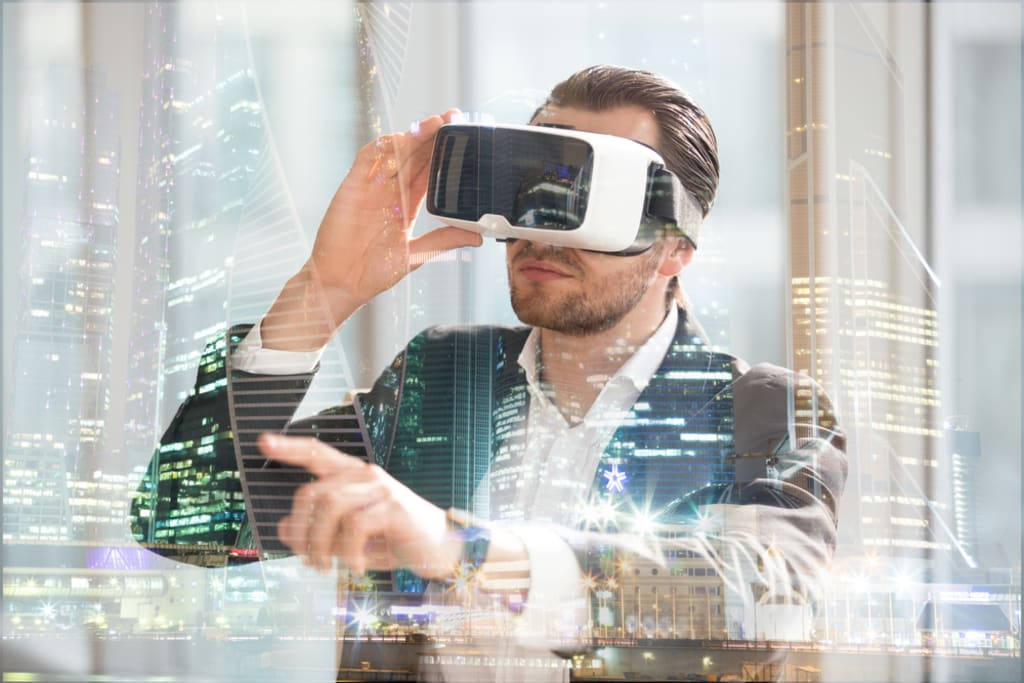The Future of Mobile App Development with AR/VR Technologies
The future of mobile app development with AR and VR technologies is incredibly bright.

In today's fast-evolving mobile app landscape, staying at the forefront means adopting revolutionary technologies that redefine user engagement. Augmented Reality (AR) and Virtual Reality (VR) are not just tech trends; they're reshaping how we interact with mobile apps. AR enhances the real world by adding digital layers, offering immersive educational tools and creative marketing avenues. Picture exploring history through an app that overlays facts on real-world locations or virtually trying out products like furniture or makeup.
On the other hand, VR immerses users in fully digital environments, from intense gaming realms to lifelike simulations for professional training. These technologies extend beyond entertainment, enabling advanced training modules, virtual travel experiences, and intuitive interfaces. As AR and VR become more accessible, AR/VR developers can create apps that seamlessly integrate into everyday life, pushing the boundaries of mobile app innovation.
As AR and VR technologies advance and become more accessible, they're set to transform mobile app development across industries. Yet, challenges like data management and processing power remain. Overcoming these hurdles will unlock even greater potential for these technologies to redefine how we use mobile apps, offering richer, more immersive experiences than ever before.
Statistics on AR and VR Technology in Mobile App Development
Augmented Reality and Virtual Reality technologies are emerging as game-changers in the fast-evolving landscape of mobile app development. Recent statistics emphasize their rapid ascent: by 2029, the global AR and VR market is expected to soar to $62.0 billion, showcasing their expanding influence across diverse sectors. This growth is fueled by their potential to transform user experiences and revolutionize how businesses interact with consumers.
A survey conducted by Perkins Coie further illuminates this trend, revealing that 66% of industry experts anticipate AR and VR becoming mainstream within the next three years. This widespread adoption plays a pivotal role in shaping the future of mobile app innovation and engagement.
Integrating AR and VR into mobile apps offers compelling advantages: heightened user engagement, enhanced brand visibility, and a competitive edge in a crowded marketplace. By embracing these cutting-edge technologies early on, businesses can meet evolving consumer expectations and pioneer immersive experiences that captivate and retain users.
As we delve deeper into the statistics and trends driving AR and VR adoption in mobile app development, it becomes clear that these technologies are not merely trends but essential tools for forward-thinking businesses aiming to lead in digital transformation.
How AR and VR are Revolutionizing Mobile App Development
Augmented Reality and Virtual Reality are reshaping the landscape of mobile app development. These technologies are expanding the horizons of what mobile apps can achieve, providing users with deeply immersive experiences that were once the stuff of science fiction.
The Rise of AR and VR in Mobile App Development:
Broadening Horizons: Initially popular in gaming, AR and VR are now enhancing apps across various sectors such as healthcare, education, and retail. This shift is driven by the desire to deliver more engaging and interactive user experiences.
Market Growth: Reflecting their increasing adoption, the AR and VR market is projected to soar, with estimates suggesting a growth to $209.2 billion by 2023.
Transformative Benefits for Mobile Apps:
Enhanced Engagement: These technologies captivate users, increasing both engagement and retention by making app interactions more memorable and enjoyable.
Innovative Marketing: AR and VR offer new ways for businesses to connect with customers, allowing for personalized and interactive marketing strategies that stand out.
Elevated Experiences: By integrating AR and VR, apps deliver unique experiences that significantly boost brand awareness and user satisfaction.
Adopting AR and VR technologies sets a company apart and equips it to meet future consumer demands in an ever-evolving digital landscape. This is why an increasing number of businesses are leveraging these technologies to enrich their mobile applications, ensuring they remain competitive and relevant in a crowded market.
AR/VR in Mobile App Development: Trends and Use Cases
Explore the impact of AR and VR in mobile app development through these emerging trends and practical use cases.
1. Mobile Augmented Reality
Mobile Augmented Reality (AR) has revolutionized how we interact with our smartphones and tablets, bringing digital elements into our real-world surroundings. Widely accessible through apps like Pokémon Go and Snapchat filters, mobile AR has captivated millions by blending virtual objects seamlessly with the physical environment. This technology's allure lies in its ability to enhance everyday experiences, from gaming adventures to interactive marketing campaigns. As mobile devices continue to evolve technologically, so too will the sophistication and utility of mobile AR applications, promising even more immersive and engaging digital interactions in the future.
2. Augmented Reality Glasses
Augmented Reality (AR) glasses are groundbreaking wearable devices that merge digital content seamlessly with the physical world. Unlike traditional screens, these glasses overlay virtual information onto the user's field of view, enhancing everyday experiences with interactive digital elements. Companies like Microsoft, Google, and Magic Leap have pioneered AR glasses, demonstrating their potential in various industries.
With advancements in mobile app development services, more companies are exploring innovative applications for AR glasses, aiming to revolutionize how we interact with technology by offering hands-free, immersive experiences that redefine productivity and entertainment.
3. Education and Training
Education and training are being revolutionized by VR technology, offering immersive learning experiences that enhance understanding of complex subjects. Students benefit from hands-on simulations in a safe environment, facilitating practical learning and skill development.
Similarly, VR applications extend to professional training across diverse sectors like healthcare, construction, and manufacturing. Employees can engage in realistic scenarios, gaining practical experience and refining skills crucial for their roles. This integration not only enhances learning outcomes but also underscores VR's potential in advancing educational methodologies and professional development through mobile app development services.
4. Architecture and Design
In architecture and design, VR technology is revolutionizing the way projects are conceptualized and presented. Clients can now immerse themselves in virtual environments that showcase detailed designs and architectural plans. VR allows for interactive walkthroughs of buildings and spaces, offering a realistic preview of how the final product will look and function.
This transformative use of VR not only enhances client engagement but also streamlines the design process by identifying potential issues early on. By partnering with mobile app development companies, architects and designers can harness VR's power to create innovative and visually compelling presentations that set new standards in the industry.
5. Advertising and Marketing
VR technology is transforming the landscape of advertising and marketing by offering immersive and engaging experiences that captivate consumers. Imagine being able to try out products virtually before making a purchase decision or stepping into a branded VR world where interactions with products feel lifelike and memorable.
These innovations in VR allow brands to stand out in crowded markets, offering unique and interactive ways to connect with their audience. By leveraging mobile app development services, businesses can harness VR's potential to create impactful marketing campaigns that leave a lasting impression and drive consumer engagement to new heights.
Conclusion
The future of mobile app development with AR and VR technologies is incredibly bright. These technologies will transform how we interact with our devices, providing immersive and interactive experiences. AR overlays digital information onto the real world, making learning and marketing more engaging. As developers in mobile app development in Houston and beyond innovate, the applications of AR and VR in mobile apps will expand. While challenges exist, the benefits outweigh them. The integration of AR and VR promises a dynamic, engaging, and immersive mobile experience, revolutionizing the way users interact with digital content.
About the Creator
Sakshi
I’m Sakshi, a professional contributor, and blogger, specializing in writing on Business, Technology, and Lifestyle related content for the web.
Enjoyed the story? Support the Creator.
Subscribe for free to receive all their stories in your feed. You could also pledge your support or give them a one-off tip, letting them know you appreciate their work.






Comments (1)
Hi Sakshi! 🌟 Your article on the future of mobile app development with AR and VR is truly insightful! 👏 The way you explore the transformative potential of these technologies is both engaging and enlightening. I'm especially fascinated by how AR and VR can redefine user experiences and open new possibilities in app development. Your detailed analysis and forward-thinking perspective make this a fantastic read! Looking forward to more of your thought-provoking articles. 😊